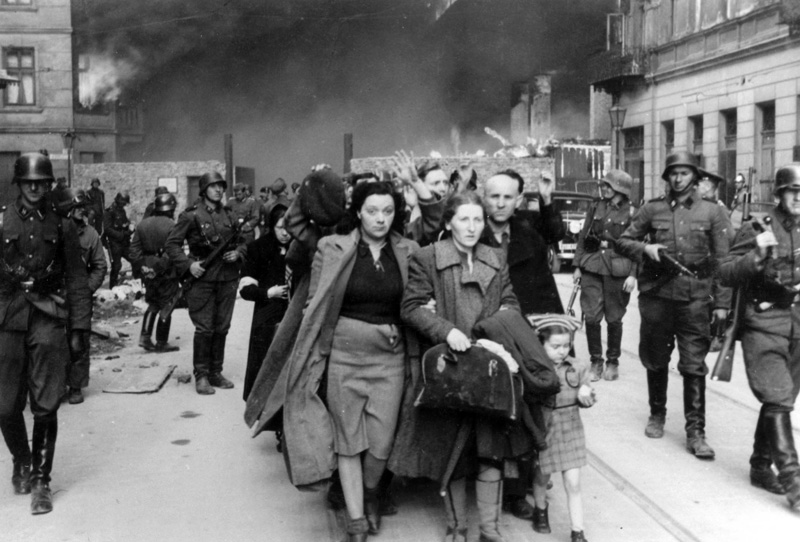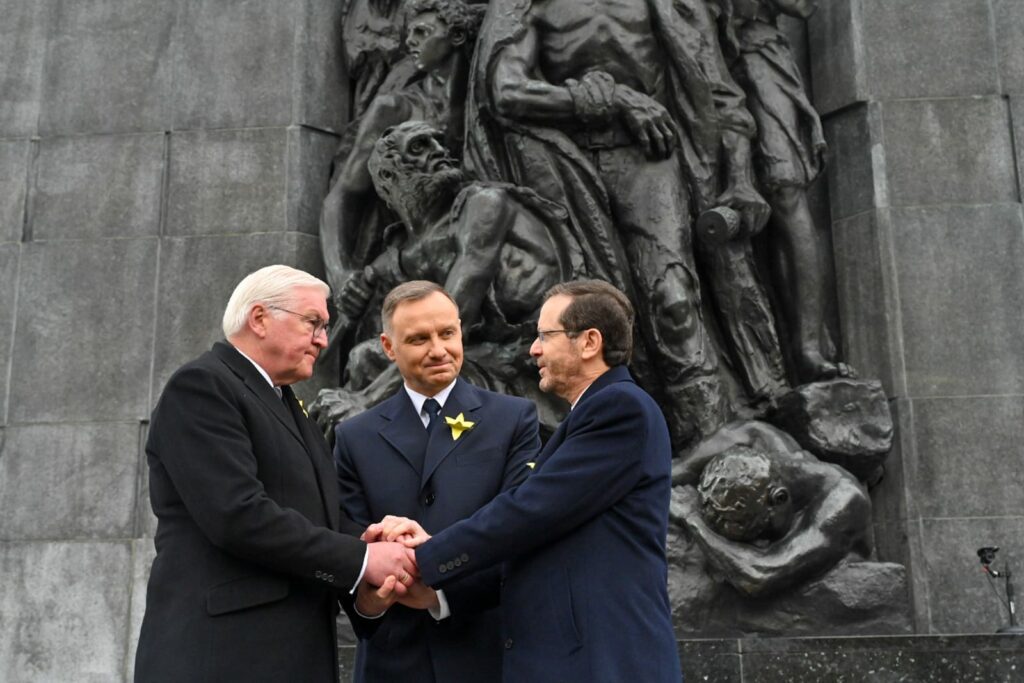The uprising on 19 April 1943 in the Warsaw ghetto was the first uprising in any Nazi occupied city in Europe during WWII and has become a symbol for heroic resistance against all odds.
In a joint ceremony last week, the presidents of Germany, Israel and Poland paid tribute to the resistance fighters who fought for their lives and freedom under both Jewish and Polish flags. It was inevitable that the three presidents would also draw lessons learned for their own countries and refer to the on-going war in Ukraine and Russia’s aggression.
“The terrible crimes Germans perpetrated here fill me with shame but also gratitude and humility to be able to participate in this event as the first German head of state to do so,” said Germany’s president, Frank-Walter Steinmeier. He also mentioned the war in Ukraine.
“We Germans have learned our lessons. When we say ‘never again’ we mean never again racism and persecution but also never again occupation and aggression in Europe, which is why we, Poland and other allies, are helping Ukraine in the war against Vladimir Putin’s aggression.”
Desperate uprising
On 23 August 1939, Nazi Germany and the Soviet Union signed the notorious Molotov-Ribbentrop pact, named after their foreign ministers, which divided Eastern Europe and led to the outbreak of the second world war a week later.
Before the war, ca 3.3 million Jews or 10 % of the total population were living in Poland. 3 million of them were murdered by the Nazis and their collaborators. A similar number of ethnic Poles were killed during the war. Poland was occupied by Nazi-Germany and Soviet Union that tried to eradicate Polish independence. Nazi-Germany treated Poland as a colony to serve its economic interests.
The Warsaw ghetto was the biggest ghetto established by the Nazis in their murderous plan to exterminate the Jews by all means, diseases, starvation, forced labor, shooting and gassing in the death camps. Nazi Germany weaponized typhus in the war and used it as pretext for establishing the ghetto. For Nazi Germany, the genocide of the Jews became more important than winning the war.
In October 1940, Jews were forbidden to leave the ghetto. After 15 November 1940, a brick wall was built that surrounded an area of 3.4 km2 and all of Warsaw’s then about 400,000 Jewish inhabitants were confined in the ghetto. This density in the ghetto was some 5- to 10-fold higher than the densest city in the world. The sealing was an extreme form of “quarantine”.
In the summer of 1942, Jan Karski, a Polish officer and diplomat, toured the Warsaw ghetto and saw first-hand the results of the Nazi-German extermination policy. The events in the ghetto were also documented by Emanuel Ringelblum, the ghetto’s historian. Those who survived the typhus epidemy would be deported to the death chambers of the Treblinka extermination camp.
In April 1943, the few surviving people in the ghetto launched a desperate revolt against the Nazi murder machine. The fighters were organized in a number of combat groups under the command of the 24-years old Mordechai Anielewicz and consisted of Zionist and non-Zionist Socialist groups. A revisionist right-wing Zionist party played also a role in the revolt and organized its own combat group.
When the resistance was first organized in July 1942, it hardly had any weapons. Preparing for the uprising, it managed to receive or buy a small number of weapons from the Polish side and improvised its own explosive devices. The revolt broke out on 19 April 1943 and lasted for several weeks. The bunker on Mila 18 with Anielewicz fell on 8 May.

German soldiers leading Jews captured during the suppression of the uprising. From the report by the SS-general who commanded the liquidation of the ghetto. The original photo reads 'forcibly taken from the bunker', credit: Yad Vashem. The World Holocaust Remembrance Center
The SS-general who commanded the German troops published photos from the burning ghetto and wrote in his report that women participated in the uprising and were armed as men. “More than once they were shooting with pistols in both hands or hid hand grenades in their underpants until the last minute against the Waffen-SS, army and the police.”
In 1943, no-one interfered to help the fighters in the burning ghetto. Artur Ziegelbaum, who represented the Jewish-Socialist party Bund in the Polish government in exile in London, committed suicide in protest against the passivity of the outside world. The resistance fighters appealed for help but their appeals fell on deaf ears.
Victorius after all
In his speech, Israel’s president Isaac Herzog quoted Zivia Lubetkin, a woman he had admired his whole life and a resistance fighter. “It was clear to us that we had no chance of victory, in the usual sense of the word. But we knew that at the end of the day, we would emerge victorious. We are the weak ones. But our strength lay in this: we believed in justice. We believed in humanity.”
“I come here today from Jerusalem, the eternal capital of the free, sovereign, Jewish, and democratic State of Israel,” Herzog said.” I come here, and with me—with us—here, are the sons and daughters of entire families, entire communities, who were, and continue to be, symbols of vibrant Jewish life, a millennium-old history, the rich and prosperous civilization of Polish Jewry.”
”I imagine what they would have said, what they would have thought, if in those dark hours, in the stench of the sewers and suffocating cellars, staring down the barrels of guns and tanks, someone had whispered in their ears that eighty years later, we—the Presidents of Poland, Israel, and Germany—would be standing here and saluting their heroism.”
He reminded that the freedom fighters in the ghetto were not totally alone. “With them, in a heroic battle against the Nazis and their accomplices, in every country, were the Righteous Among the Nations and members of the local resistance movements, including, of course, here in Poland, the Polish Righteous Among the Nations and members of the Polish underground, who risked their lives and chose not to stand idly.”
Bridging different historical narratives that in recent years have disrupted Polish – Jewish reconciliation and relations, Herzog thanked the Polish president Andrzej Duda for his “colossal efforts and commitment to the task of remembrance and commemoration, including right here, in this place. We must remember: there is nothing postmodern or relativistic about Holocaust remembrance.”
In his speech, the Polish president stressed that the Jewish rebels fought for the freedom over one’s own fate. He described them as an example for “soldiers guarding Israel’s borders and for Polish soldiers guarding Poland’s borders".
M. Apelblat
The Brussels Times

